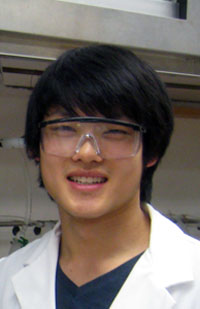What's New?
The 2012-2013 Beckman Scholars: Wade Wang
| Faculty Mentor: Professor C. Grant Willson Length of term: Summer 12, Fall 12, Spring 13, Summer 13 Honors & Awards:University Honors (Fall 10, Spring 11, Fall 11, Spring 12); ACS Undergraduate Research in Polymer Science Travel Award (2013); Life Technologies award for excellence in Biochemistry Research (2012); UT Austin Undergraduate Research Fellowship (2012, 2013); Semiconductor Research Corporation Undergraduate Research Fellowship (2012, 2012); Burl Gordon Rogers Endowed Presidential Scholarship in Chemistry (2011); TAMS Research Scholarship (2009, 2010); Dean's Honored Graduate (2013) Publications:Shibata, S., Fu, Q., Bivens, T.B., Hastings, J.L., Wang, W., and Levine, B.D. J. Physiol., 590(15), 3495, 2012. Gu, X., Cho, Y., Kawakami, T., Hagiwara, Y., Rawlings, B., Mesch, R., Ogata, T., Kim, T., Seshimo, T., Wang, W., Willson C.G., et al. Proc. SPIE, 7972, 2011. Shibata, S., Wang, W., VanGundy, T.B., Galbreath, M.M., Fu, Q., and Levine, B.D. Medicine & Science in Sports & Exercise, 42(5), 2010. Where is he now? Graduated with Bachelor of Science (Biochemistry Honors) with Honors, with Special Departmental Honors in Biochemistry, May 2013. Wade is currently at graduate school in the Department of Chemistry at MIT. How can I contact him? wangwade at mit.edu |
 |
Beckman research project in the Willson group
Synthesis and characterization of self-immolative polymers
Reversible polymerizations of polymers, like other reversible chemical reactions, are governed by the well known Gibb's free energy equation, DeltaG = DeltaH-TDeltaS. Because most polymerizations are driven by enthalpy and bring about a decrease of entropy, incrementing the temperature during a polymerization reaction can eventually lead to a positive DeltaG, resulting in the reverse reaction being more favored and causing active, or growing, polymer chains to spontaneously depolymerize. The temperature at which the polymerization and depolymerization of an active polymer chain occurs at equal rates is known as the ceiling temperature (Tc) of the polymer. Polymers with a low Tc are referred to as self-immolative polymers. These polymers will only be able to exist in temperatures above their Tc if the active end of the polymer chain is masked. One popular method of masking the active end of the polymer chain is capping with a protecting group, or trigger. This trigger can be designed to be removable by specific conditions, thus creating a polymer that will decompose into monomer units in the presence of trigger removing conditions. In sum, self-immolative polymers are engineered to disassemble into small molecules upon activation by the removal of a protecting group, or trigger.
Self-immolative polymers have a great potential for applications in many fields given the flexibility afforded by the trigger. Furthermore, these polymers have seen many uses in situations that require amplification and rapid depolymerization in response to specific stimuli . One application that has not yet been investigated is their use in block copolymers. A block copolymer is composed of multiple covalently connected homopolymers. By linking multiple homopolymers with varying hydrophilicity or hydrophobicity, block copolymers can be made to phase separate in solutions. In this way, micelles can be assembled in solution with block copolymers containing one hydrophobic block, such as polystyrene, and one hydrophilic block, such as polyethylene oxide . These self immolative micelles have the potential to serve as a highly tunable, easily synthesized platform for controlled delivery that could potentially combine the amplification of self immolative polymers with the selectivity and other properties of micelles. Additionally, there is an interest in the Willson lab to exploit the signal amplification abilities of self-immolative polymers for imaging and photolithography. This involves synthesis and characterization of self-immolative polymer systems that are sensitive to extreme ultraviolet light (wavelength Å 13.5 nm). There are two major goals for this project: to design a unique low Tc polymer for potential applications in both imaging and micelles and to synthesize and characterize micelles comprised of self immolative block copolymers.
Created and maintained by Ruth Shear. Comments to author at DrRuth@mail.utexas.edu
Created Wed Jun 6th 2007. Last modified Mon, Mar 16, 2015.